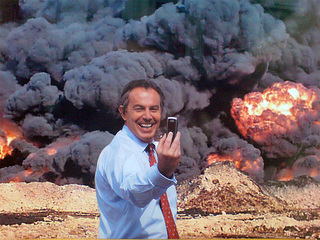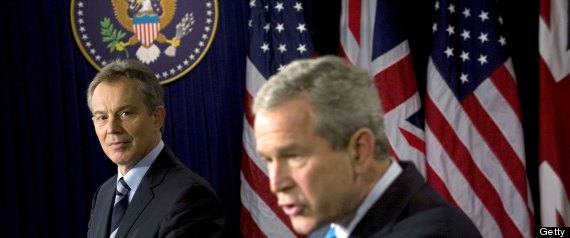
On 23 April, Tony Blair, former UK Prime Minister and butcher of Iraq gave what his supporters a defining speech on the threat posed by political Islam. Some went as far as to compare it to Churchill’s Iron curtain speech in 1946, where the former British Prime Minister urged the west to formulate a coherent policy against an existential ideological threat. In his widely reported speech Blair spoke of ‘a titanic struggle’ against the forces of political Islam. Drawing a picture of the entire Middle East region, Blair despaired against the ‘reluctance’ in the West to face up to what the problem is, ‘the issue of the rightful place of religion, and in particular Islam, in politics’. Calling for an overarching narrative, he implored the west to observe the common thread underlying all crises in the region, that of a ‘radicalised and politicised view of Islam, an ideology that distorts and warps Islam’s true message’. Drawing upon earlier attempts, namely by right-wing US think tanks and European policy makers, he posits the majority of Muslims maintain a separation between religious observance and politics. For Blair the epicenter of politicized Islam remains the Middle East, and more has to be done to counter this distorted narrative, controversially recent political spats with Russia shouldn’t sidetrack the west from build common cause with Putin and China.
وَيَمْكُرُونَ وَيَمْكُرُ اللّهُ وَاللّهُ خَيْرُ الْمَاكِرِينَ
“They were plotting and Allah was plotting, but Allah is the Best of Plotters.”
(Al-Anfal, 8:30)
On 23 April, Tony Blair, former UK Prime Minister and butcher of Iraq gave what his supporters a defining speech on the threat posed by political Islam. Some went as far as to compare it to Churchill’s Iron curtain speech in 1946, where the former British Prime Minister urged the west to formulate a coherent policy against an existential ideological threat. In his widely reported speech Blair spoke of ‘a titanic struggle’ against the forces of political Islam. Drawing a picture of the entire Middle East region, Blair despaired against the ‘reluctance’ in the West to face up to what the problem is, ‘the issue of the rightful place of religion, and in particular Islam, in politics’. Calling for an overarching narrative, he implored the west to observe the common thread underlying all crises in the region, that of a ‘radicalised and politicised view of Islam, an ideology that distorts and warps Islam’s true message’. Drawing upon earlier attempts, namely by right-wing US think tanks and European policy makers, he posits the majority of Muslims maintain a separation between religious observance and politics. For Blair the epicenter of politicized Islam remains the Middle East, and more has to be done to counter this distorted narrative, controversially recent political spats with Russia shouldn’t sidetrack the west from build common cause with Putin and China.
Western and Muslim commentators have roundly criticized Blair’s messianic zeal and the alarmist tone of his speech. Most however have focused on his lack of credibility after the Iraq debacle, his millions made on the back of services rendered to Arab and Central Asian dictatorships for ostensibly ‘consultancy work’ and his call to garner constructive relations with Russia during a week of escalating rhetoric over Ukraine. The substantive point of his speech, however, has hardly been given much attention and if it has, it has been to highlight the perceived absurdity of his narrative. The more substantive point was to highlight the real threat from ‘political Islam’. In other words, the desire of Muslims to return to a rule based Islamic polity based upon Islamic law and a rejection of secular liberalism. Even Blair fails to correctly posit the struggle as one of clear ideological alternatives, instead characterising a return to Islamic polity as ‘incompatible with the modern world – politically, socially, and economically’. Erecting a classic straw man, Blair points to the failed Morsi government in Egypt, kidnapping and murder in Nigeria and Hizbullah’s influence in Syria as the sum result of the return to political Islam.
On his substantive assertion, however, Blair is entirely right. There is a desire to return to Islam, not ‘political Islam’ or ‘Islamism’ but Islam as a system for society. The Arab revolutions have started a process of change, where only one outcome is inevitable, and that is the re-establishment of the Khilafah. Yet Blair fails to take on in any substantive way what Islamic polity entails, instead resorting to lazy diatribe and indolent examples of so-called excess (largely a result of western interference). A more genuine approach would be to tackle head on Islamic solutions, it is not as if western policy makers are unaware of the detailed nature of Islamic economic, political or social rules. Yet such an approach would fail to win credibility amongst western publics, many of who are weary of the war mongering of their politicians. Muslim societies across the world are moving against secular liberalism, despite the promotion of liberal Islam and Islamic scholars who recite Qur’an beautifully whilst drawing pay checks from gulf dictatorships. Blair’s desire to setup no-fly zones across Syria is an attempt to subvert the Islamic nature of the revolution and to promote the liberal opposition who reside outside Syria and have no succour amongst ordinary Syrians.
Underlying Blair’s analysis is a clear political motive. By emphasising a more proactive Syria strategy, highlighting Hizbullah’s role in the crisis, dampening expectations of the US-Iran rapprochement, and supporting the Sisi offensive against Morsi, Blair is echoing and communicating the policy of the Gulf states. These states, in particular Saudi Arabia have shown a growing unease towards a rebalancing and shift of power towards Iran. Iran’s defining influence in Iraq, rapprochement with the US under its new President Hassan Rouhani, its nuclear ambitions and its influence in Afghanistan (frontrunner Abdullah was a member of the Northern Alliance, which was supported and funded by Iran and favoured by them). Saudi Arabia had publicly fallen out with the US over Iran, with President Obama’s visit in early 2014 aimed at smoothing the relationship. The Gulf states are increasingly perturbed by Iran’s growing influence. Saudi Arabia has also been worried about the US Syria policy, funding many of the opposition forces on the ground and attempting to contain their Islamic tendencies. Whilst the US position has been to show alarm at the Islamic influence of the opposition, Blair steered clear of mentioning this, rather calling for a more proactive military strategy. Furthermore he singled out Morsi and the Muslim Brotherhood, cynically caricaturing his government as a radical Islamic one (knowing full well it was anything but) to give credence to the Saudi war against the Brotherhood and support for the Sisi government (an estimated £1bn was donated to oust Morsi). Blair’s suggestion that any spectrum of Islamic government is unacceptable does not however extend to the so-called ‘Islamist’ government of Turkey, which Blair has previously praised as ‘the true face of Islam’. In sum, Blair’s speech was no more than doing the bidding for the Gulf monarchies.
The west’s experience with Islam is long and enduring and western attempts to subvert Islamic revival goes back hundreds of years and predates 9/11 and the War on Terror. According to the eminent French scholar Maxime Rodinson, “Western Christendom perceived the Muslim world as a menace long before it began to be seen as a real problem”. Its roots go back to the Crusades, where enmity towards the Islam’s expansion led to a series of battles sought on behalf of European kingdoms, ready to describe Muslims as bloodthirsty, licentious and later anti-modern. Interestingly, Bernard Lewis, a British born orientalist concedes ‘Islam is the most deeply held identity of the Muslim masses’ and he noted the idea of separating Islam from politics is a Christian notion alien to Islam. The Islamic tone of the revolution in Syria and the battle to return to true Islamic polity across the Muslim world is underway, the revolutions are still in flux, the west and its Arab proxies have used a number of means to thwart and subvert this except to tackle head-on the Islamic ideology.
إِنَّ الَّذِينَ كَفَرُوا يُنْفِقُونَ أَمْوَالَهُمْ لِيَصُدُّوا عَنْ سَبِيلِ اللَّهِ ۚ فَسَيُنْفِقُونَهَا ثُمَّ تَكُونُ عَلَيْهِمْ حَسْرَةً ثُمَّ يُغْلَبُونَ ۗ وَالَّذِينَ كَفَرُوا إِلَىٰ جَهَنَّمَ يُحْشَرُونَ
“Those who disbelieve spend their wealth barring access to the Way of Allah. They will spend it; then they will regret it; then they will be overthrown. Those who are disbelievers will be gathered into Hell.”
(Al-Anfaal, 8:36)
Abdullah Jaleel

